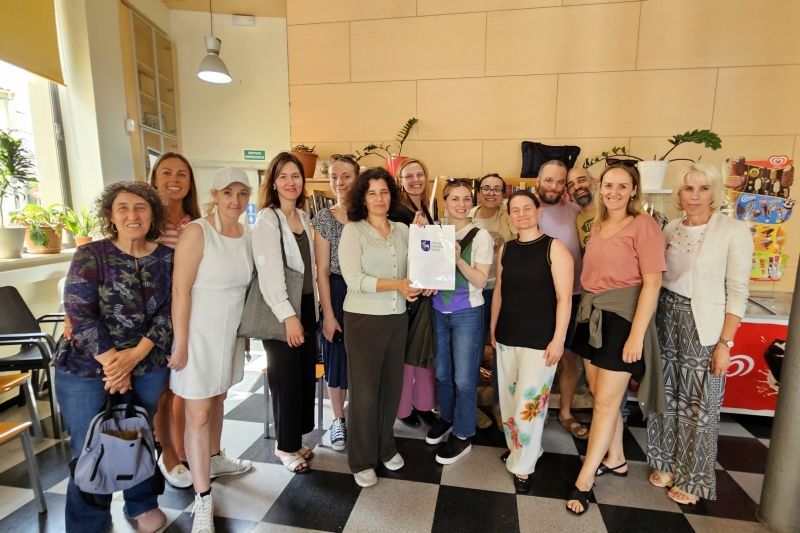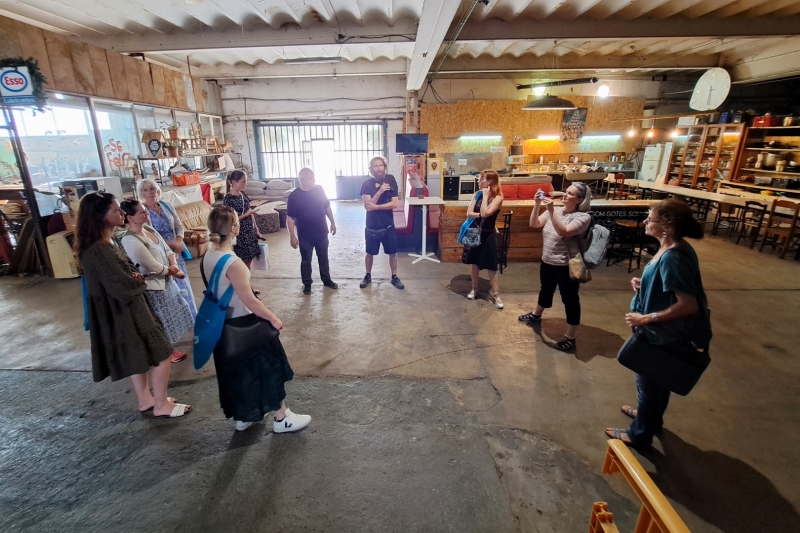
The Learning Trip to Spain took place between 27th and 31st of May in the Social Entrepreneurship and Innovation Ecosystem of Catalunya for the RE:IMPACT project LL-00020 “Improving the social entrepreneurship ecosystem in Zemgale and Northern Lithuania”. Total of 11 delegates from Latvia and Lithuania attended meetings and visits hosted by the generous actors of the Social Entrepreneurship and Innovation Ecosystem of Catalunya – representatives of cooperatives and other social enterprises, technical personnel of municipalities and Social Economy development programs etc. More than 10 meetings and visits with close to 20 institutions and organizations left an indelible impression on the delegation who returned to RE:IMPACT partner organizations inspired and ready to enhance the implementation of the project going forward.
What were the Learning Trip goals?
The following Learning Objectives were set for the participants of the RE:IMPACT Learning Trip Learning Trip to Barcelona, capital of Catalunya, Spain:
- Recognize the potential development areas for SEs, as well as dimensions and elements of Local Action Plan Framework/s to foster social entrepreneurship in the regions.
- Envision the latent collaboration opportunities and the potential of partnerships for fostering positive social impact for local communities.
- Apply new knowledge to designing public sector innovative approach/es as to SE support services in the territories targeted by the #RE:IMPACTproject.
What were the #RE:IMPACTproject delegates learning?
The following topics and themes were covered through the Learning Trip activities, such as meetings and visits, with venues in the capital Barcelona, the city of Girona and the town of Mataró:
Education and learning. Among the lessons learnt were the details regarding the competences and skills necessary for Social Entrepreneurship and Innovation. Moreover, the SEIE actors must be supported through public and/or private learning and skills transfer initiatives in order for Social Innovation to become the mainstream within the activities of Social Enterprises. Career development specialists, in Catalunya, play a very important role in delivering skills for Social Economy.
Diversity. We observed a diversity of industries and service sectors which make use of social entrepreneuring models. The Learning Trip participants learnt that SEs operate in arts, crafts and cultural, as well as agro or agrifood and tourism or adjacent sectors. Hospitality, restaurant and catering businesses are another large group of Social Economy Organizations. Likewise, there is a diversity of legal forms that Social Enterprises use for their business activities, cooperatives being one of them.
Local/regional embeddedness. #RE:IMPACTproject partners learned of the relevance of Social Economy actors and relationships between them on the macro (federal/national), meso (regional/Catalonian government) and micro (local authorities/municipal the city of Girona and the town of Mataró) levels. This Learning Trip revealed the need for capacity building programs tailored to the diversity, educational needs and rural vs. urban dynamics of the SEI ecosystems.

How were the #RE:IMPACTproject delegates learning?
The methodology applied throughout design of the Learning Trip and implementation of learning activities was a constructivist teaching approach which had stages of pre-instruction, observation, reflection and reporting. The learners received instructions as themes and topics covered on any given day of the Learning Trip. Then, the learners had to reflect on what they saw and record their observations and reflections on a form. At the end of each day the filled-out forms were collected by the Learning Trip coordinator. Collective reflection took place upon learners’ return to Latvia and Lithuania respectively.
The lessons learnt will improve the #RE:IMPACTproject in several ways. First, the lessons learnt will inform the comparative analysis framework, one of the RE:IMPACT activities. Second, taking into account the educational traditions of Catalunya are important for creation of didactical materials: yet another activity under the project. Finally, local embeddedness of the actions fostering and promoting social entrepreneurship is very important. The #RE:IMPACTproject will benefit from the nuanced understanding of the social enterprise and territory connection.
#RE:IMPACTproject partners are Zemgale Planning Region, Social Entrepreneurship Association of Latvia (Latvijas Sociālās uzņēmējdarbības asociācija), Rokiškio rajono savivaldybė (Rokiškis District Municipality Administration) and LiSVA – the Lithuanian Social Business Association. This organization was in charge of the D.1.1.3.Learning Trip activity of this Interreg Lat-Lit 2024-2026 project. Representatives of all partner organizations participated in this key activity of the project.
Interreg Lat-Lit web-article (and EPALE learning experience article) written by the business expert who coordinated the D.1.1.3.Learning Trip to Spain. Lessons learned from the Social Entrepreneurship and Innovation Ecosystem of Catalunya for the RE:IMPACT project LL-00020. “Improving the social entrepreneurship ecosystem in Zemgale and Northern Lithuania”. #RE:IMPACTproject
This article has been prepared with the financial support of the European Union. The Zemgale Planning Region is fully responsible for its content, and it may not reflect the official position of the European Union.

